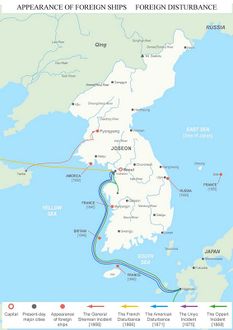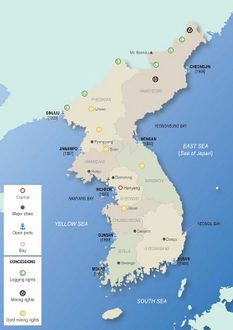"The Opening of Joseon"의 두 판 사이의 차이
(새 문서: {{Kor Article| |Article= }} <gallery mode=packed heights=220px> </gallery> <gallery mode=packed heights=220px> </gallery> =='''Related Articles'''== *[[]] =='''References'''== <re...) |
|||
| (같은 사용자의 중간 판 3개는 보이지 않습니다) | |||
| 1번째 줄: | 1번째 줄: | ||
{{Kor Article| | {{Kor Article| | ||
| − | |Article= | + | |Article=강화도조약으로 이뤄진 조선의 개항 |
}} | }} | ||
| + | |||
| + | Up until 1876, the [[Joseon|Joseon dynasty]] closed its doors and ostracized Western people, looking down on them. This assertion was led by [[Heungseon Daewongun (Joseon)|Heungseon Daewongun]], father and regent of [[King Gojong (Joseon)|King Gojong]] and his ideology of "protecting justice and ostracizing injustice" (''uijeong cheoksa''). They regarded a [[Neo-Confucianism|Neo-Confucian]] philosophy-based order as a righteous one while considering Western ideas and socio-political systems as unjust ones. | ||
| + | |||
| + | But Joseon had to open its ports after signing the [[Japan-Korea Treaty of 1876]], as pressed by [[Japan]]’s military force. However, some Joseon intellectuals began to aspire to open its doors even before opening the ports. | ||
| + | |||
| + | Some of the Joseon intellectuals, including [[Bak Je-ga]] and the famous [[Jeong Yak-yong]], argued to open Joseon’s doors. Their argument was eventually accepted by the government during the reign of King Gojong. | ||
| + | |||
| + | Having successfully carried out the Meiji Reforms in 1868, Japan continuously negotiated with Joseon to establish diplomatic relations. But Heungseon Daewongun rejected Japan’s proposal. After he resigned from office, those scholar-officials who sought modernization began to actively argue to adopt an open-door policy. | ||
| + | |||
| + | Leveraging this atmosphere in Joseon, Japan sent three warships to the Port of [[Busan]] to threaten Joseon, and an additional warship to [[Ganghwado Island]] to induce Joseon’s garrison soldiers to cannonade them. In response, Japanese soldiers landed on Yeongjongjin Port of Ganghwado Idland, beating Joseon’s troops. While first provoking, Japan rather asked Joseon to apologize, and it strongly proposed conditions of free passage of its ships in Joseon’s territorial sea and opening some ports. After negotiations, the two countries signed the a treaty in 1876. The treaty is a typical unequal pact as it was intended to "invade" Joseon in political and military way. | ||
| + | |||
| + | Since opening the ports, the regime of King Gojong and [[Empress Myeongseong (Joseon)|Queen Min]]’s family actively accepted new cultural factors from Japan and China. But tariff-free trade with Japan based on the unequal pact allowed Western products to flood into Joseon. These foreign products caused the financial collapse of domestic handicraftsmen, tenant farmers and small merchants, aggravating conflicts between low-income people and feudalistic landlords. While Joseon opened some of its ports as the government accepted the continued request of intellectuals, Japan’s invasion-intended military diplomacy also played decisive role in the process. Thus, the unequal pact shook roots of Joseon’s socio-economic structure, ultimately resulting in Japan’s colonial invasion. | ||
<gallery mode=packed heights=220px> | <gallery mode=packed heights=220px> | ||
| + | 파일:2-7.연미정-ESC_9013.jpg|Ganghwado Island | ||
</gallery> | </gallery> | ||
<gallery mode=packed heights=220px> | <gallery mode=packed heights=220px> | ||
| + | File:025(E).jpg|Foreign Ships during Joseon | ||
| + | File:050(E).jpg|Joseon Opening of the Ports | ||
</gallery> | </gallery> | ||
=='''Related Articles'''== | =='''Related Articles'''== | ||
| − | *[[]] | + | *[[The Country of the Eastern Noblemen - Joseon]] |
| + | *[[A New Imperial Nation is Proclaimed - The Korean Empire]] | ||
| + | *[[The Assassination of Empress Myeongseong]] | ||
| + | *[[Japan-Korea Treaty of 1876]] | ||
| + | *[[Heungseon Daewongun (Joseon)]] | ||
| + | *[[King Gojong (Joseon)]] | ||
| + | *[[Empress Myeongseong (Joseon)]] | ||
| + | *[[Bak Je-ga]] | ||
| + | *[[Jeong Yak-yong]] | ||
| + | *[[Busan]] | ||
| + | *[[Ganghwado Island]] | ||
| + | *[[Joseon]] | ||
| + | *[[Japan]] | ||
| + | *[[Neo-Confucianism]] | ||
=='''References'''== | =='''References'''== | ||
2017년 11월 29일 (수) 12:04 기준 최신판
Up until 1876, the Joseon dynasty closed its doors and ostracized Western people, looking down on them. This assertion was led by Heungseon Daewongun, father and regent of King Gojong and his ideology of "protecting justice and ostracizing injustice" (uijeong cheoksa). They regarded a Neo-Confucian philosophy-based order as a righteous one while considering Western ideas and socio-political systems as unjust ones.
But Joseon had to open its ports after signing the Japan-Korea Treaty of 1876, as pressed by Japan’s military force. However, some Joseon intellectuals began to aspire to open its doors even before opening the ports.
Some of the Joseon intellectuals, including Bak Je-ga and the famous Jeong Yak-yong, argued to open Joseon’s doors. Their argument was eventually accepted by the government during the reign of King Gojong.
Having successfully carried out the Meiji Reforms in 1868, Japan continuously negotiated with Joseon to establish diplomatic relations. But Heungseon Daewongun rejected Japan’s proposal. After he resigned from office, those scholar-officials who sought modernization began to actively argue to adopt an open-door policy.
Leveraging this atmosphere in Joseon, Japan sent three warships to the Port of Busan to threaten Joseon, and an additional warship to Ganghwado Island to induce Joseon’s garrison soldiers to cannonade them. In response, Japanese soldiers landed on Yeongjongjin Port of Ganghwado Idland, beating Joseon’s troops. While first provoking, Japan rather asked Joseon to apologize, and it strongly proposed conditions of free passage of its ships in Joseon’s territorial sea and opening some ports. After negotiations, the two countries signed the a treaty in 1876. The treaty is a typical unequal pact as it was intended to "invade" Joseon in political and military way.
Since opening the ports, the regime of King Gojong and Queen Min’s family actively accepted new cultural factors from Japan and China. But tariff-free trade with Japan based on the unequal pact allowed Western products to flood into Joseon. These foreign products caused the financial collapse of domestic handicraftsmen, tenant farmers and small merchants, aggravating conflicts between low-income people and feudalistic landlords. While Joseon opened some of its ports as the government accepted the continued request of intellectuals, Japan’s invasion-intended military diplomacy also played decisive role in the process. Thus, the unequal pact shook roots of Joseon’s socio-economic structure, ultimately resulting in Japan’s colonial invasion.
Related Articles
- The Country of the Eastern Noblemen - Joseon
- A New Imperial Nation is Proclaimed - The Korean Empire
- The Assassination of Empress Myeongseong
- Japan-Korea Treaty of 1876
- Heungseon Daewongun (Joseon)
- King Gojong (Joseon)
- Empress Myeongseong (Joseon)
- Bak Je-ga
- Jeong Yak-yong
- Busan
- Ganghwado Island
- Joseon
- Japan
- Neo-Confucianism


